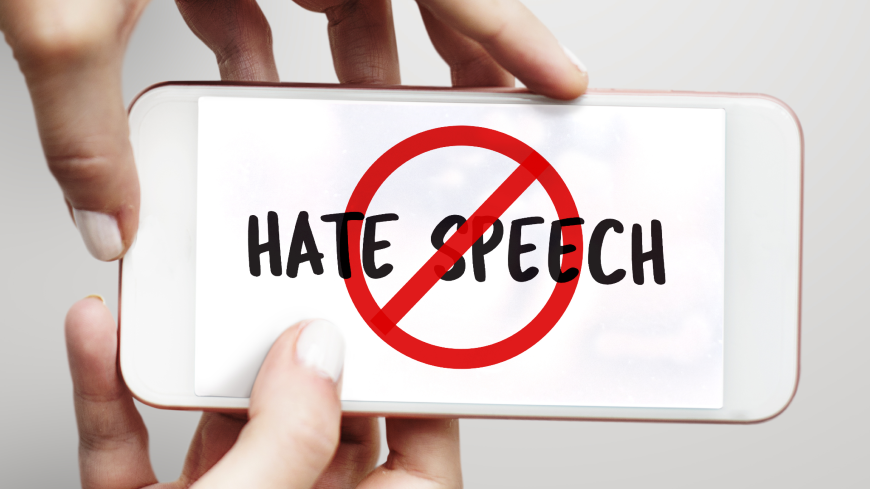
Featured Item

Parliament told: hate crime has grown
Hate crime, hate speech, and bias-motivated violence in South Africa have grown in recent years, Alana Baranov of the South African Jewish Board of Deputies (SAJBD) told Parliament in the SAJBD’s submissions on the Prevention and Combating of Hate Crimes and Hate Speech Bill on 29 March.
Baranov was making oral submissions to the Parliamentary Portfolio Committee on Justice. She represents the SAJBD on the Hate Crimes Working Group (HCWG), a multisectoral network of civil society organisations that advocate for hate crimes awareness, education, monitoring, and legislation.
She said that in the two decades since the first democratic elections, South Africa had made significant progress in ensuring that freedom, dignity, and equality were respected and afforded to all. However, in stark contrast to the country’s progressive policy and legislative guarantees of fundamental human rights, incidences of hate crimes, hate speech, and bias-motivated violence “have only grown in recent years”.
The SAJBD is a founding member and current steering committee member of the HCWG.
Baranov began her presentation with a brief discussion on antisemitism and its history in South Africa, focusing on three key concerns regarding the Bill that were among those raised in the written submission to Parliament last year.
She said a working definition of what constitutes antisemitic behaviour might be “any malicious act aimed at Jewish people, organisations or property, where there is evidence that the act has antisemitic motivation or content, or that the victim was targeted because they are [or are believed to be] Jewish”.
Such acts included assault, vandalism, threats, verbal abuse, graffiti, hate mail, boycott initiatives specifically aimed at South African Jews (including Jewish-owned or managed business enterprises) and the dissemination of overtly antisemitic literature.
“Antisemitism can also manifest under the guise of hostility to the state of Israel and/or to Zionism,” she said.
“Anti-Zionism doesn’t automatically amount to antisemitism, but in certain instances, it takes such extreme forms as to resonate strongly with traditional antisemitic tropes and stereotypes. Times of intensified conflict between Israel and its neighbours invariably see a sharp rise in antisemitic activity locally and internationally,” she said.
Baranov told Parliament that there had been a steady upsurge in antisemitism around the world since the beginning of the century, with many countries with significant Jewish populations recording consistently higher numbers of attacks on an annual basis. Relative to these countries, “South Africa has low rates of antisemitism, both in terms of the number of incidents and their severity. About 60 incidents are recorded each year, mainly taking the form of verbal abuse or hate mail. Incidents involving physical violence, while not unknown, are rare.”
However, even in South Africa, there has been an upward trend in the number of incidents recorded annually since 2000, she said.
Social media provides a platform for the propagation of hate speech, Baranov said. “No regulatory bodies exist to monitor, moderate, and take action against such abuse, and the nature of social media also enables perpetrators to publish offensive material anonymously.”
She said a number of highly inflammatory attacks against the Jewish community, including incitement to violence, had been propagated on Facebook and Twitter.
Highlighting some key points from the Board’s written submission last year, Baranov said that the success of legislation in achieving its purpose was “heavily reliant” on the effectiveness of statutory bodies, whose purpose was to address issues of racism, racial discrimination, and related intolerance. These include the South African Human Rights Commission (SAHRC), Equality Courts, and media-regulation bodies like the Broadcasting Complaints Commission of South Africa.
“Currently, these institutions are severely under-resourced in terms of qualified personnel available to deal with the volume of complaints received,” she said, which has resulted in a large backlog of complaints and inordinately long waiting periods between the submission of a complaint and its eventual resolution.
“Sometimes, the resolution of a complaint is prolonged even further through the matter having to make its way through the courts, with no recourse to expediting the process,” said Baranov. She cited two highly publicised cases as examples of overly prolonged matters before the SAHRC, namely the Bongani Masuku and Tony Ehrenreich cases, which took years. In order for the Bill to be effective in discouraging and penalising hate crimes and providing a remedy for the victims, the SAHRC, Equality Courts, and other regulatory authorities must be sufficiently staffed and resourced to enable complaints to be dealt with timeously, Baranov said.
She said adjudicating hate crimes, particularly when it involved hate speech, was “complex” and that it was imperative that all law enforcement officials and judicial officers were educated and trained regarding hate crimes and how to deal with them.
“There is a serious lack of understanding about what constitutes a hate crime and what the appropriate response should be,” Baranov said.
She said it was difficult for the average South African to address complaints through the existing system since processes were often time consuming, expensive, and complex.
Though the Equality Courts were set up to provide cost-free and reasonably swift remedies for those unable to approach the higher courts, in the SAJBD’s experience, bringing matters before it had required as much of an investment of time and expenditure as normal civil litigation. Even when cases were resolved, it required further follow up which was time consuming and expensive.
She said it was also important to educate the wider community about their rights and options, and how they could seek practical remedies through the public institutions and resources available.
In protecting South Africans from hate crimes and hate speech, she said there was a need to address the root cause of the problem and change hearts and minds on the issue of tolerance and diversity.
“How people view and relate to those who differ from them – by race, religion, sexual orientation, or in many other ways – is conditioned by the culture in which they are raised, and the environment in which they grow up and are educated. The challenge is to foster a culture of respect for and tolerance of difference at all levels of society, with particular focus on the youth,” she said.
The SAJBD recommended strengthening current restorative justice programmes and the expansion of tolerance education, which must be regarded as a crucial component of the school syllabus.
Baranov told Parliament that hate crimes and hate speech damaged social cohesion and had no place in a country still healing from the wounds of its oppressive and racist past. She said the consequences of hate crimes and hate speech were “far reaching”, and the Board hoped the Bill would be passed soon.
“The Bill would send a strong message that any form of prejudice is unacceptable in our society; assist the police and prosecutors in investigating, charging, and prosecuting hate crimes and hate speech; give courts meaningful sentencing guidelines; and allow for the effective recording of data so that we can better understand the nature and scope of the problem and create successful interventions.”








